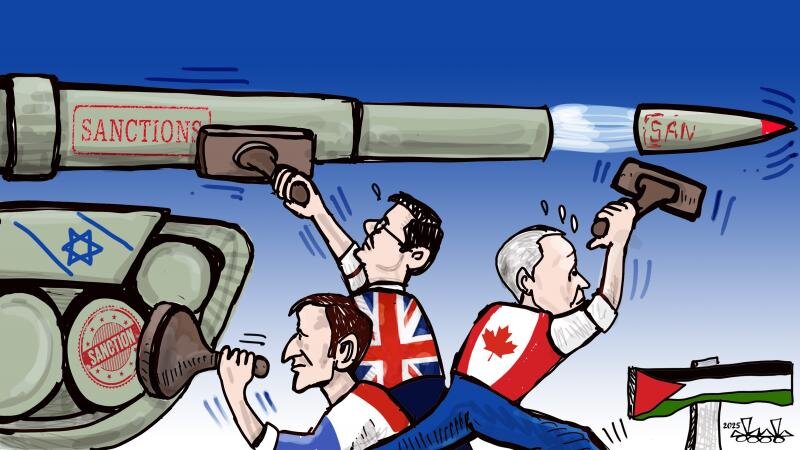Tehran-As the War of Gaza reaches its most frightening crescendo, the European Union’s last-minute diplomatic plot and rhetorical condemnation have been welcomed in one quarter as a “fork-point moment” in relations with Israel.
But if you look closely, you’ll get a track record of blatant hypocrisy, double standards, and continued refusal to confront the highly humanitarian values that the EU has publicly declared to support.
The EU’s unreserved support for Israel in the opening months of the Gaza War and its effective inaction when the humanitarian crisis enveloped small lands revealed a naked contradiction in European foreign policy.
Early month of the Gaza War
From the start of the war, the European Union’s attitude was clear: “We are with Israel.” Shortly after the Hamas attack on October 7, 2023, EU Commission Chairman Ursula von der Leyen and many top officials offered Israel a symbolic embrace as well as a political embrace.
The Council of Europe issued a statement denounced Hamas “on the strongest possible terms.”
This unconditional support was not merely symbolic. Several EU countries, such as Austria, suspended aid to the Palestinian region, reflecting Israel’s narratives without their qualifications. Former EU foreign policy director Josep Borrell, who was later critical of Israel’s siege tactics, joined other European officials who justified Israel’s wildness as Israel’s “right to protect itself.”
Europe provided diplomatic cover for Israeli military campaigns and the devastating siege of Gaza.
European silence and co-infidelity
As Israeli military action in Gaza escalated and the humanitarian situation worsened, many felt the European Union responded and inconsistent.
Despite clear evidence of serious violations of humanitarian law and rising deaths among Palestinians, leaders like Spain Pedro Sanchez and Ireland’s Leo Varadocar called on the EU to reconsider its association agreement with Israel in February 2024, but the European Commission did not act beyond the year.
This lack of action continued even when the lockdown pushed Gaza to the brink of starvation, with deaths exceeding 50,000. The UN Special Rapporteur on Palestine suggested that the EU should cut ties with Israel to prevent more violence, but the EU hesitated, citing the need for a deal between member states.
As conditions continued to decline, the EU began issuing slightly important statements, but there was no actual action yet. Humanitarian aid was inconsistent.
“Turning Point”: Too little, too late
In May 2025, after 11 weeks of total aid lockdown and the deaths of more than 53,000 Palestinians, the EU finally issued a formal review of the association agreement with Israel.
Despite unprecedentedness, this action brings challenging questions. Why did it take so long? And what real impact does that have, given the history of putting trade and strategic interests ahead of human rights?
Supported by the majority of EU foreign ministers, this review is presented as a response to a violation of Article 2 of the Human Rights Agreement. But the truth is that despite the threat of “concrete action” and the threat of a potential suspension of trade privileges from European leaders, priority tariffs and economic ties remain primarily in place.
One example of the many iconic nature of Europe’s recent stance is the UK’s announcement that it will end new trade negotiations with Israel while maintaining the current trade agreement.
The recent episode of warning shots at Jenin is aimed at diplomatic delegations, including European officials. Kaja Karas, the current EU diplomat head, called the attack “unacceptable” in response to the demand for accountability, but it is doubtful whether the bloc will be able to protect diplomats, let alone Palestinian civilians.
The incident sheds light on the limitations of European influence and the loss of sleep over a possible European response, and the refusal to be mere statements and reviews rather than actual sanctions or policy reversals.
Double standards and the erosion of moral authority
The EU’s response in Gaza is then dramatically different, with other challenging global crises, particularly special military operations in Russia’s Ukraine. European leaders summoned the “rules-based international order” and the sanctity of Ukraine’s human rights, imposed fundamental sanctions on Russia, and convened unprecedented diplomatic pressure.
However, in the face of Israeli illegal activities in Gaza, the EU response has been muted and divided as actions leading European politicians could now be massacred.
This double standard is not noticed by the world’s masses. It must rise from moral bankruptcy and set its own red line for war crimes and crimes against humanity in Gaza. It would clarify the credibility of EU as a supporter of international law, as Josep Borrell correctly foresaw.
The belief that the West is hypocritical has incited extremism internationally, undermining the EU’s soft power and corroding its effects.
EU faces critical tests surrounding Gaza
The EU is facing a moment of truth as the humanitarian crisis worsens and the war in Gaza continues. So far, it has shown that it has not supported hypocrisy, inaction, and its own declared principles.
The unwavering support for Israel and the actual inaction that caused the Gaza disaster cannot be eliminated by the recent gusts of diplomatic activities, the threat of “concrete actions” or “concrete actions.”
The EU risks further undermining moral authority and international influence, unless it is prepared to back up rhetoric with concrete actions, such as suspending trade agreements, enforcing arms embargoes, and taking responsibility for violations of international law.
The world sees, and history evaluates Europe based on its actions rather than its words.

